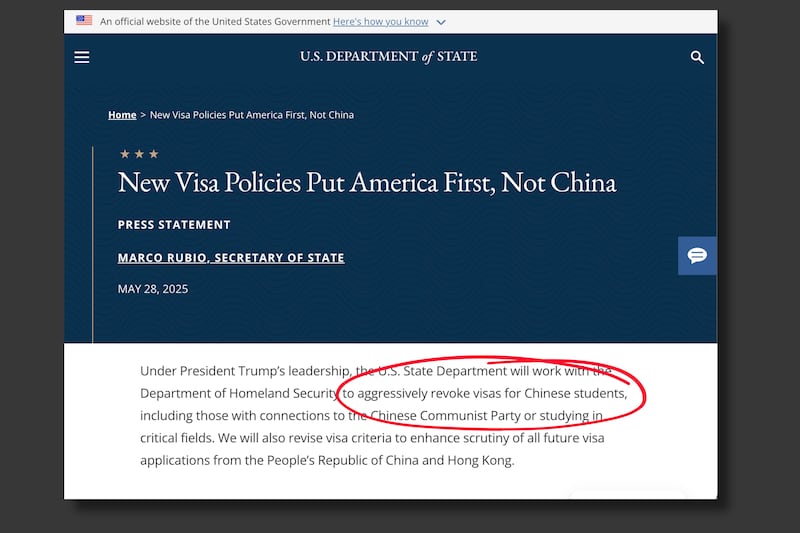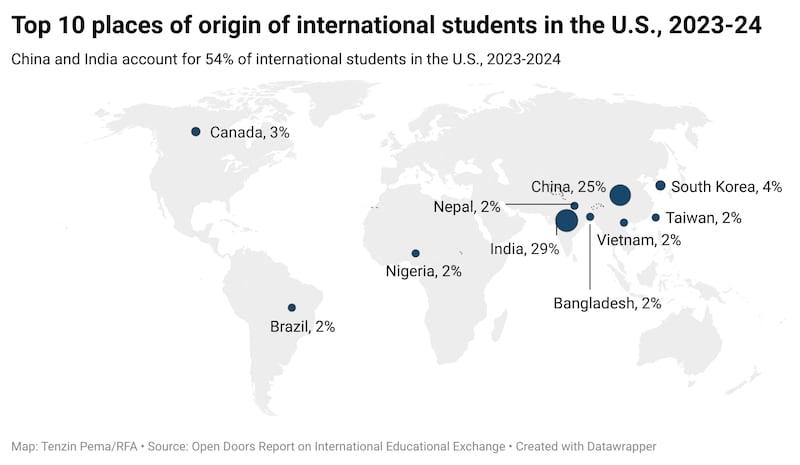Chinese students who represent about a quarter of foreign students in the United States expressed anxiety on Thursday while the Trump administration interrupted visa interviews and announced more difficult screening for candidates for American universities.
In the United States, Chinese students have expressed concerns so as not to be able to travel freely, and a student who is a human rights activist said that she now felt pressure from the Chinese government and the United States government.
“The current situation in the United States feels increasingly uncertain – even dangerous,” Mary, who graduated from an American college this month, told Radio Free Asia. She asked for a pseudonym for security reasons. “This double threat is devastating,” she said.
In China, potential students also went to social networks to express confusion and distress after the US Secretary of State Marco Rubio announced On Wednesday, the United States will work “aggressively” to revoke visas for Chinese students, including those who have links with the Chinese Communist Party (CCC) or study in critical fields.
The United States will also revise the visa criteria to improve the examination of all applications of future visa of the People's Republic of China (PRC) and Hong Kong, said Rubio, in a press release entitled “The new visa policies first put America, not China”.
American legislators have long raised concerns about China acquire access to sensitive technology and know-how in American colleges.
But the Chinese government said that it “firmly opposes” the decision and protested the United States for using ideology and national security as a pretext to take “fully unjustified” measures.
“This politically motivated and discriminatory decision exposes American hypocrisy to freedom and openness. It will further damage the image and reputation of the United States itself,” MAO Ning, a spokesman for the Chinese government, said on Thursday.
Mao said this decision “seriously injured” the rights and interests of international students in China and disrupts people's exchanges between the two countries.

Rubio's announcement is likely to deepen tensions in an American-Chinese relationship already tense regarding the trade.
He follows other stages of the Trump administration to dissuade international students, in particular by ordering the embassies to suspend new meetings on student visas in the midst of increased social media verification.
While the United States has only a few hundred students in China, Chinese students are only ranked behind India in their number in the United States
In the United States, 277,398 Chinese students during the 2023-24 academic year, second behind India, with 331,602, according to the “door report opened by the American state”. Together, India and China represented 54% of all international students, according to the report.
Rubio's announcement generated hundreds of comments on the Chinese social media platform Xiaohongshu, known as Rednote in English on Wednesday, including issues on impacted study subjects.
“Cognitive neuroscience, brain science, computer linguistics, biomedical genius – one of these areas considered criticism?” asked for a surfer named Nailong.
Rubio did not specify which fields were considered “criticism”. Nor was there any clarification provided on the “connections with the CCP” which would be examined. He could explain a large part of the Chinese student body.
The Communist Youth League of China, for example, had around 75.32 million members aged 14 to 28 at the end of 2024, and around 2 million related organizations in schools, colleges and universities, with around 98.5 million members.
Darkest moment
Mary, the human rights activist who has just completed her studies in the United States, said that she was urgently re-evaluated her future career plans and now planned to seek job opportunities abroad.
“For Chinese students, international students and the entire education sector, this week may have marked a darkest moment,” said Andrew Chen, vice-president of the interest group of China members at NAFSA, the association of International Educators, in a video published on WeChat.
“But everyone must assume their own growth and future. Each family must make choices quickly – to improve their academic and employment capacities, “said Chen, who advised Chinese students wishing to continue other studies in the United States, majors and sensitive establishments related to American defense in China.

Chinese students who are already in the United States should work to improve their profile “as quickly as possible”, so that they can find a job in the country more easily in the near future, he added.
On social media platforms, Chinese students currently based in the United States have expressed concerns so as not to be able to travel freely in the midst of more strict visa measures.
“If you are in the United States, you can no longer go home. I miss the house,” said a surfer, Chaochao, on Rednote.
Other Chinese nationals have also expressed concerns about their future. “Will this affect an EB-1 request?” Asked a surfer named Quq, referring to an American visa based on employment for people with extraordinary capacities in their respective fields.
According to NAFSA, a non-profit association based in the United States, focused on international education, international students contributed $ 43.8 billion to the American economy and supported 378,175 jobs during the 2023-2024 academic year.
For three international students, a job in the United States is created and supported by the expenses of international students for accommodation, higher education, catering, retail, health, telecommunications and transport, he added.
The American House Selective Committee on the PCC praised Rubio's announcement on Wednesday. President John Moolenaar said on Thursday: “The American student visa system has become a Trojan horse for Beijing, offering unrestricted access to our main research institutions and constituting a direct threat to our national security.”
“If it is left untreated, this trend will continue to move American talents, compromise research integrity and feed China's technological ambitions at our expense,” said Moolenaar.
Edited by Mat Pennington.

